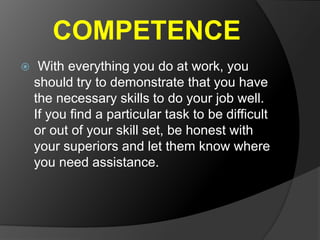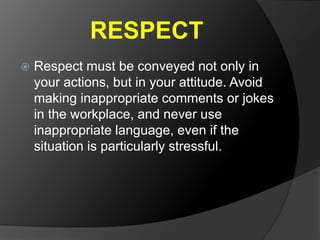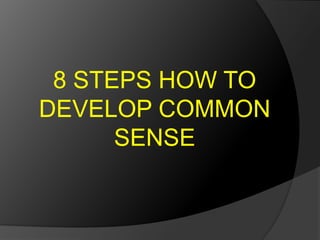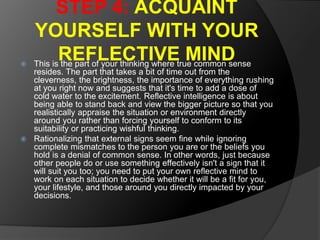Common sense
- 2. INTRODUCTION Common sense is the practice of acting intelligently in everyday situations. Even very smart people sometimes lack common sense, but luckily, it’s an attribute that gets better with practice. Common sense is sound practical judgment concerning everyday matters, or a basic ability to perceive, understand, and judge that is shared by ("common to") nearly all people
- 3. The first type of common sense, good sense, can be described as "the knack for seeing things as they are, and doing things as they ought to be done.“ The second type is described as folk wisdom, "signifying unreflective knowledge not reliant on specialized training or deliberative thought." There are two types of common sense
- 5. TRUSTWORTHINESS When you are hired to do a job, your employer trusts you to arrive at work punctually, to carry out your responsibilities, and to give your full effort and attention to your job. If you continue to excel in these areas, you will earn more and more trust from your superiors.
- 6. COMPETENCE With everything you do at work, you should try to demonstrate that you have the necessary skills to do your job well. If you find a particular task to be difficult or out of your skill set, be honest with your superiors and let them know where you need assistance.
- 7. RESPECT Respect must be conveyed not only in your actions, but in your attitude. Avoid making inappropriate comments or jokes in the workplace, and never use inappropriate language, even if the situation is particularly stressful.
- 8. COURTESY It’s often the small things that matter the most to people. Even simple social courtesies such as inquiring about the well-being of your coworkers will show them that you are a positive, caring person, and will have a positive impact on your work environment.
- 9. DEPENDABILITY A good employee is relied upon to fulfill all responsibilities without having to be told twice. Being proactive will show your employer that you can be fully trusted.
- 10. COOPERATION Being a team player is one of the most important aspects of being professional in the workplace. Almost every career requires you to work hand-in-hand with others to complete a set of goals. Try to show your leadership qualities while simultaneously encouraging others to offer advice and assistance.
- 11. COMMITMENT Showing motivation is one of the most certain ways to earn the respect of your boss. Being committed to your job demonstrates that you have a personal stake in the quality of your work, which proves that you will do more than the average employee to ensure the job is well done. Don’t be afraid to stay overtime at work, and try to follow up on the jobs you have already completed.
- 12. APPROACHABILITY Make it known to your coworkers and superiors that you are available to them. Whether they have questions, are in need of your assistance, or simply want to chat, having an air of approachability will make you a better team player and make it more likely that they will be willing to help you in return.
- 13. ACCOUNTABILITY Do not be afraid to admit it when you have done something wrong. Making excuses to cover up a misstep – no matter how small – will simply make you look arrogant. Owning up to your mistakes shows your coworkers that you are able to take responsibility for your actions.
- 14. MATURITY Being in the workplace means that you must carry yourself like an adult. Do not overreact when things go wrong, do not use informal or inappropriate language, and do not play practical jokes on your peers. By showing your coworkers that you can act as an adult, you will prove that you are trustworthy, respectful, and dependable.
- 15. 8 STEPS HOW TO DEVELOP COMMON SENSE
- 16. STEP 1: FAMILIARIZE YOURSELF WITH THE PURPOSE AND MEANING OF COMMON SENSE According to Merriam Webster, common sense is about exercising "sound and prudent judgment based on a simple perception of the situation or facts". This definition suggests that common sense depends on not over-complicating the situation (simple), applying experience and general knowledge to the situation (sound and prudent judgment), and implicit in this is self-trust that your considered experience is valid for future situations. Karl Albrecht calls common sense practical intelligence.
- 17. He defines it as "the mental ability to cope with the challenges and opportunities of life". He explains that common sense is situational, dependent on context, and that your common sense in one aspect of your life might be excellent while failing abysmally in another aspect of your life. As to the purpose of common sense, it is basically thinking that prevents you from making irrational mistakes or decisions, a thinking approach that may open your eyes to the possibility that insisting on being right prevents you from seeing the bigger picture. Common sense can also serve the purpose of removing you from being hidebound to rules, theories, ideas, and guidelines that would hamper or stifle the best decision in a particular situation. In other words, just because something says so, or just because it has always been done that way, is not a reason to abandon common sense about present needs and changed circumstances
- 18. STEP 2 : UNDERSTAND THE EASE WITH WHICH THE HUMAN MIND IS CONVINCED THAT AN IDEA IS RIGHT CONTRARY TO INDICATORS CLEARLY DEMONSTRATING OTHERWISE. We're human; we're fallible. And our brains work in certain ways as a means of providing shortcuts to ensure survival in a world where being chased by predators could end your life. In a modern world where caves and saber toothed tigers are no longer a constant companion, some of that reactive, split second judging can land us in hot water as we react instead of reflecting, assume instead of teasing apart the realities, and follow habit instead of challenging its continued utility. Some of the things our amazing mind is capable of doing to override common sense include:
- 19. STEP 3: DIVORCE YOURSELF FROM REALITY This isn't an invitation to insanity. This is a request to consider that your sense of reality isn't real. What you see is what you've programmed your brain to see. And once you start down the slippery slope of self-confirmation that reality is only ever what you see it as, you're open to the possibilities of bigotry, selfishness, intolerance, and prejudice because you'll constantly seek to make everyone and everything else conform to your standard of reality, and your standard of "what's right". By divorcing yourself from this one-sided reality, and learning as much as you can about how other people perceive the world and our place in it, you begin to make room for common sense to grow because your sense is built on "common" experiences, not just your own.
- 20. STEP 4: ACQUAINT YOURSELF WITH YOUR REFLECTIVE MIND This is the part of your thinking where true common sense resides. The part that takes a bit of time out from the cleverness, the brightness, the importance of everything rushing at you right now and suggests that it's time to add a dose of cold water to the excitement. Reflective intelligence is about being able to stand back and view the bigger picture so that you realistically appraise the situation or environment directly around you rather than forcing yourself to conform to its suitability or practicing wishful thinking. Rationalizing that external signs seem fine while ignoring complete mismatches to the person you are or the beliefs you hold is a denial of common sense. In other words, just because other people do or use something effectively isn't a sign that it will suit you too; you need to put your own reflective mind to work on each situation to decide whether it will be a fit for you, your lifestyle, and those around you directly impacted by your decisions.
- 21. STEP 5 :REACQUAINT YOURSELF WITH YOUR RAPID COGNITION. The previous step has just suggested that you need to reflect more before you take decisions or act. But the obvious flipside to reflection is the reality that some things need very fast thinking and rapid decisions that will produce sound results. Rapid cognition is the type of thinking that tells you that you're not going to connect with a person the moment that you meet them, or that a poorly placed ladder is going to fall sooner rather than later and needs to be shifted pronto, or that you need to quickly jump out of the way of an out-of-control car now. How do you marry rapid cognition to reflective thinking under the rubric of "common sense"? It's simple - spend your reflecting time wisely so that you will react wisely when quick thinking is required. Common sense builds on your reflection over past experiences, enabling you to refine your understanding of the world and how it works time and time again. This is in contrast to a person who only ever reacts on gut reactions, biases, and has failed to reflect on prior experiences. Reflection will bring about sound "gut reactions" or fast assessments of situations because your reaction is based on having taken the time to work through errors and successes of past experiences.
- 22. STEP 6 : LEARN THINGS THAT ARE BASIC COMMON SENSE There are things that every human being should know how to do and not leave to another person, things that go to the heart of personal survival, self- knowledge, and long-term health and safety. In this way, you can learn common sense through practical knowledge and application, informing you accurately when times are harder or when you must react quickly.
- 23. STEP 7: PUT NEW COMMONSENSE THINKING HABITS INTO PLACE Take the philosophy, the psychology, and the popular theories behind how we think and add this understanding to the active ways in which you can use your common sense. Get some great ideas for restoring your sense of relying on your own innovative thinking processes. And Karl Albrecht suggests that the following methods will help to keep your practical intelligence (common sense) in top shape (and it's recommended that you read his book in its entirety).
- 24. STEP 8: IF YOU PUT IN THE CONSTANT HARD YARDS OF THINKING THINGS THROUGH CAREFULLY FOR YOURSELF AS WELL AS LEARNING ALL THAT YOU CAN ABOUT THE WORLD AND OTHER'S THOUGHTS ABOUT THE WORLD, YOU'RE WELL PLACED. You don't have to be highly educated; you do have to be open-minded and curious. And realize that this is a process, not a destination. You will have to make the mental effort throughout your life as to which messages you absorb and which people you allow to influence your thinking. Even this article is but one source of guidance on common sense – analyze it, critique its applicability to your own circumstances, and cherry pick, discard, or adopt those things that suit you or don't fit with you. After all, doing so just makes plain common sense.
- 26. Common sense is a phrase that generally implies something everyone knows. One of the definitions of common sense given by Wikipedia is, “good sense and sound judgment in practical matters.” Common sense psychology is a myth. What appears to be common sense is often common nonsense. Scott Lilienfeld, co-author of 50 Great Myths of Popular Psychology, says we should mistrust common sense when evaluating psychological claims.
- 27. Some examples of common sense psychology include: People with low self esteem are more aggressive. Working while in high school will help students build character and value money. Children who read a lot are not very social or physically fit. The best way to treat juvenile delinquents is to get tough with them. Most psychopaths are delusional. We know what will make us happy.


























